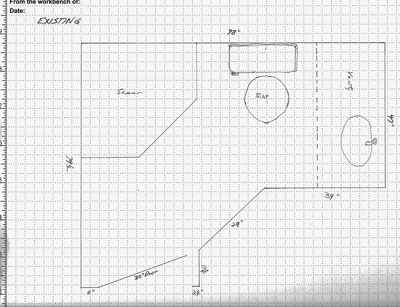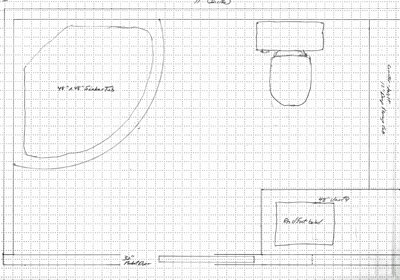
 by Steven D. Johnson
by Steven D. Johnson
Racine, Wisconsin
(Page 3 of 5)
Previous Page
1
2
3
4
5
Next Page
Remodeling Versus Woodworking
Click on any picture to see a larger version.
How many [pick a group of people] does it take to screw in a light bulb? As my mind wandered about while endlessly sanding a new desk I've been building, the old joke kept morphing, "How many woodworkers does it take to remodel a bathroom?"
The answer and punch line is, "Only one, but it takes 12 times as long."
That might be exaggeration, but certainly it takes longer. As woodworkers we obsess a bit more over the length we cut a stud, the square-ness of a corner, and the smoothness of a coat of drywall mud than would a more robustly rounded handyman (I mean well-rounded in capabilities, not physique!).
I'm certainly not insinuating that a remodeler or carpenter works to a lower quality standard. Oh contraire… but let's face it… if a stud is a quarter-inch too long or too short, who knows? Who cares? If a wall is out of plumb by a fraction of an inch, no one will ever know or see the flaw. If some studs are not perfectly straight, the drywall can cover a host of minor irregularities. If the mud has a bubble or two, the paint will cover it. Those jagged edges around the perimeter of the floor will be hidden by trim. A slightly too-large hole surrounding an electrical box will be hidden by a switch plate.

|
Figure 3 - The current upstairs bath...
cramped with a tiny shower
|
As woodworkers, if we made a hole too large, we would discard the work piece and start over. If a leg was not absolutely perfectly square to a table top, we would reject it as "flawed" work. If a bubble appeared in a finish, we would sand it out and start over. This "pursuit of perfection" explains why a woodworker takes longer to build something a carpenter or handyman could do more quickly. That's all I am saying, so please hold off on the snarky emails.
After buying my current house there was a flurry of remodeling activity before moving in, all centered about the first floor. After moving in, I have managed to remodel just one room upstairs. It seems any remodeling project takes longer once you are living amongst the work. But it is time (past time, actually) to re-do the upstairs bath.
The plan is to enlarge the space and install a soaking tub… maybe one with jets or bubbles… and relocate and replace all the other fixtures, too. The bathroom has to be gutted to the studs, re-wired, re-plumbed, and re-insulated. And while I do look forward to lounging in a tub full of steaming water, the only part of the remodeling job I am actually looking forward to is building the vanity.

|
Figure 4 - The "plan" --- soaker tub in the corner plus the
whole space is three feet longer... please don't laugh
at my drawing
|
Of course I will build the vanity in my woodshop. And I will exercise the level of care and attention to detail befitting any piece of furniture destined for my house. Naturally, the vanity needs to be finished when the bathroom is finished "enough" for it to be installed. Timing is important. I can't imagine a finished bathroom sans vanity, but worse would be a large vanity sitting in my shop, not able to be installed because the bathroom isn't finished. No question where my priorities lay.
In order to make things "come out right," I plan to split my time rationally. Maybe spend three days each week working on bathroom de-construction and re-construction and two days in the shop working on the vanity.
The situation confronting me, as it does for many others, is how to switch my brain from "woodworking" to "remodeling" and back. If I approach the demolition and rebuilding of a wall like I approach building a vanity, I won't be finished by New Years Eve. If I build the vanity like a handyman slapping up 2 X 4 walls, my vanity will look like… well, you know what it will look like… at least it would be in the right room.
It's just not easy to go from woodworking to rough carpentry and back. From making hand-cut dovetail drawers to laying ceramic tile. To go from sheetrock mud and tape to French polishing… at least for me. Maybe it's an age thing. Maybe it's a "too set in my ways" thing. Or maybe it's a real thing that others experience. I have known several people that make their money as carpenters by day, and enjoy building beautiful furniture by night. How do you do it?
(Page 3 of 5)
Previous Page
1
2
3
4
5
Next Page
Return to
Wood News
front page

